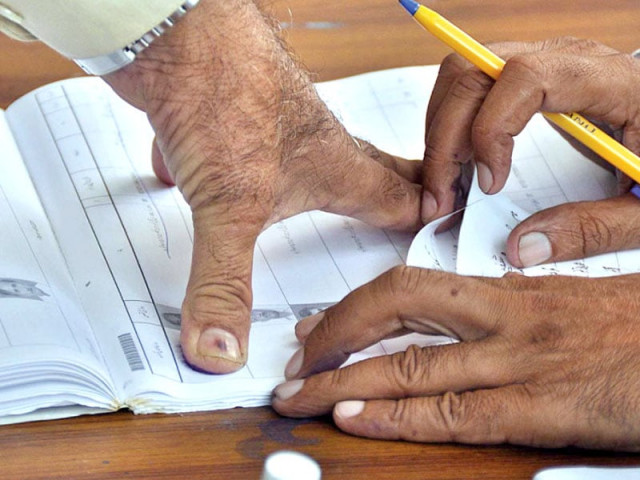Local bodies election: In rush, ECP okays tentative schedule
Seeks feedback from provincial bureaucrats, other officials on whether the schedule is practical or not.

The ECP decided that only magnetised ink would be used on stamp pads in the LG elections. PHOTO: APP/FILE
After hectic efforts, the Election Commission of Pakistan (ECP) approved on Monday a tentative schedule for the local bodies’ election. The commission, however, is unsure whether this gigantic task can be undertaken within the deadline set by the Supreme Court.
And this is why it has convened a meeting of top provincial bureaucrats and officials of relevant departments to get feedback on the practicability of the schedule.
On Monday, the ECP discussed all technical and legal issues in a marathon session chaired by Acting Chief Election Commissioner Justice Tassadiq Hussain Gillani, who is also a sitting judge of the top court.

Another meeting will follow on Tuesday (today) where invitees include all provincial chief secretaries, National Database Registration Authority chairman, managing directors of the Printing Corporation of Pakistan and Pakistan Security Printing Corporation, representatives of the statistics division, finance division and the interior ministry.
These meetings are part of an attempt by the ECP to absolve itself of the blame and throw the ball into the court of provincial governments, sources told The Express Tribune. The Punjab and Balochistan governments have told the apex court that they are ready to hold the polls on December 7, while the Sindh government has pencilled in the November 27 date for the purpose. The apex court ordered the ECP on Friday to hold LG polls accordingly.
“It is practically impossible to hold LG polls on these dates. Since the provinces have given these dates, we will ask them to make it possible if they can. There is uncertainty …,” an ECP official privy to Monday’s meeting told The Express Tribune.
Apart from completing and notifying delimitation of constituencies, issues of framing of rules in accordance with their respective LG laws, the provinces have yet to notify the district returning officers, returning officers and other staff about the elections.
For the ECP, a critical task is to rearrange the electoral lists in accordance with the delimitations to be notified by the provinces. The current electoral lists were prepared on the basis of the 2011 housing census. In the precious little time available, the provinces are delimitating constituencies by amending the delimitations used for the 2005 LG polls.
Allied departments such as the Printing Corporation of Pakistan – which has to print ballot papers in their millions – and Pakistan Council of Scientific and Industrial Research – which would have to provide ink-pads – are expected to share their ideas at Tuesday’s meeting.
In Monday’s meeting, sources said, a PCP representative told the commission that it needs at least three months to print 600 million ballot papers. Citing the example of Balochistan, he said there were around 6,500 wards in the province and it would need more than 3,000 hours if it had to change printing plates for each ward and print separate electoral rolls.
The ECP also decided that only magnetised ink would be used on stamp pads in the LG elections. And for this purpose, it would have to procure the same ink for one million pads from PCSIR.
The poll body’s director general Sher Afghan told reporters that the commission has approved a tentative schedule for the three provinces in accordance with the Supreme Court deadline. According to him, the government would be asked to ease official procurement rules to buy paper for ballot papers. Moreover, the commission has decided that instead of giving an extensive training to one million polling staff, the ECP will launch a media campaign to apprise government officials of procedures of conducting the LG polls.
Around 600 million ballot papers will be needed for the polls in three provinces while according to ECP’s initial estimates Rs6.58 billion would be required from the finance ministry for holding the polls.
To accelerate the printing process the commission is considering publishing only election symbols on ballot papers and ignoring candidates’ names and to start printing before the finalisation of candidates.
Tentative schedule
According to the tentative schedule for Sindh, the commission will announce the schedule on November 1. Nominations are to be filed on November 5; objections can be filed the next day; scrutiny can take place on November 7 and 8; election symbols will be allotted on November 13 and polling will be held on November 27. And the results will be finalised by November 30.
For Punjab and Balochistan, the schedule will be announced on November 5. Nominations would be filed from November 8 to 10; objections could be filed by November 12; scrutiny will take place from November 13 to 15; candidates could withdraw nominations by November 23; election symbols would be allotted on November 23 and polling will be held on December 7. The results will be finalised by December 10.
Legal issues
Though the ECP has announced the tentative schedule, there are still legal hiccups. The LB law passed by the Punjab Assembly has been challenged by the opposition parties, including PTI, PPP and PML-Q, while the MQM has challenged the Sindh Local Government Act in the Supreme Court.
An official working with ECP’s legal branch questioned the legality of the tentative schedule while the matter was sub judice. Another official said it was likely that the authorities concerned approach the Supreme Court and request another extension in the deadline. However, this is likely to be decided after today’s meeting.
Published in The Express Tribune, October 29th, 2013.



1724319076-0/Untitled-design-(5)1724319076-0-208x130.webp)















COMMENTS
Comments are moderated and generally will be posted if they are on-topic and not abusive.
For more information, please see our Comments FAQ